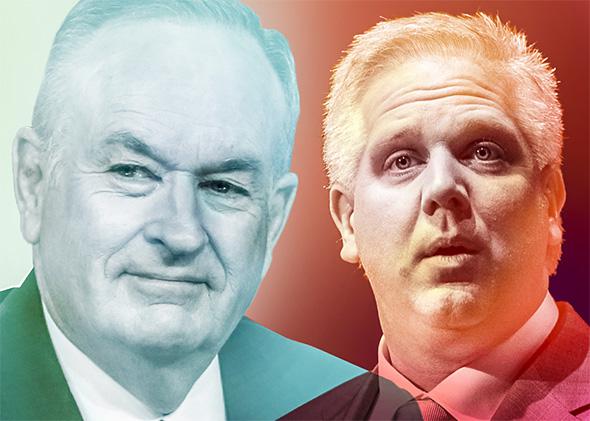For a while it looked like Bill O’Reilly could be finished at Fox News. The year was 2009, and O’Reilly’s star had been overshadowed by a larger ball of gas: Glenn Beck, whose eponymous television show launched on Fox that January and soon became the most talked-about news program in America. With his chalkboards and conspiratorial ramblings, Beck captured the Tea Party zeitgeist, and left The O’Reilly Factor in an unfamiliar position of comparative irrelevance.
Then Beck went supernova. Advertisers started to desert his program, realizing that the “paranoid goldbug” demographic was one they could do without. Beck had conflicts with Fox executives. “Beck trashes Republicans every night,” Fox News Chairman Roger Ailes told the Daily Beast in November 2010. “I’ve said to him, ‘Where the hell are you going to get your audience if you keep this up? You’re trashing everyone.’” Beck left Fox News in June 2011. Bill O’Reilly returned to dominance.
The story of Glenn Beck’s tenure at Fox News—especially its sudden end—is worth remembering now, as O’Reilly faces accusations of exaggerating the dangers he faced while a foreign correspondent for CBS in the early 1980s, among other alleged distortions. It’s OK when your grandfather exaggerates the details of his wartime experiences; it’s not OK when a journalist does it. And yet O’Reilly’s job appears to be in no danger. Fox News has issued a statement asserting that “Ailes and all senior management are in full support of Bill O’Reilly.” Far from apologizing, O’Reilly has gone on the offensive and attacked the character of the Mother Jones and Media Matters reporters who have covered the story. On Monday, O’Reilly’s program attracted 3.3 million viewers, its highest ratings of the year.
This isn’t the first time O’Reilly has faced charges that might have dimmed a lesser light. In 2004, for instance, one of his producers accused him of sexual harassment. Then, as now, O’Reilly did not apologize; then, as now, Fox News stood behind him. It’s hard to imagine Beck would have won similar support from the network if he, too, had faced allegations of exaggeration and sexual harassment. For one thing, Beck was relatively unpopular within the network, with some Fox employees fearing that Beck’s paranoid rantings undermined the credibility of Fox’s news reporting. The lesson here: From Fox News’ perspective, it’s OK to be a boorish, bullying fabulist. It’s not OK to be weird.
When news networks decide whether to discipline errant employees, they do so primarily in order to protect their brands. That’s why NBC Nightly News anchor Brian Williams was so swiftly punished after being hit with similar charges earlier this month. The Nightly News is a straightforward news program, and the network, presumably concerned about the effect the scandal would have on Williams’ and the broadcast’s journalistic credibility, responded by suspending the anchor without pay for six months.
Being accused of fabulism by liberal news outlets like Mother Jones and Media Matters doesn’t harm O’Reilly’s credibility, because O’Reilly’s credibility is dependent on exploiting a sense of victimization among his audience. Much of the Fox News demographic is composed of people who feel that they’re under attack by unscrupulous liberals. So when it appears that a host comes under attack by unscrupulous liberals, that serves to reinforce their existing worldview. The first thought isn’t Bill O’Reilly is a liar. It’s The world is out to get Bill O’Reilly.
And if the world is out to get you, then of course you’re going to fight back. Brian Williams apologized to America. O’Reilly took the opposite approach, choosing to malign the Mother Jones reporters who first raised the questions, and casting himself as a victim in a liberal conspiracy. But there’s a difference between insinuating some vague liberal conspiracy, as O’Reilly does, and attempting to unravel the details of that conspiracy, as Beck did. It’s impossible to sustain the latter without eventually starting to seem crazy. Beck’s flirtations with fringe ideas suggest a place most people—and most advertisers—would, in the end, rather not go. They damaged the Fox News brand.
O’Reilly’s apparent exaggerations haven’t done that yet, but there’s still time. As Jeremy Stahl has already noted in Slate, “the case against O’Reilly is more open to interpretation” than the case against Brian Williams, and O’Reilly will remain unassailable as long as that gray area continues to exist. The most damaging allegation, to me, is one first raised by the writer Jefferson Morley and since advanced by Media Matters, challenging O’Reilly’s claim that he was on the scene when George de Mohrenschildt—a friend of Lee Harvey Oswald’s who claimed to have inside information on the Kennedy assassination—shot and killed himself in 1977. De Mohrenschildt lived in Florida. Some of O’Reilly’s old colleagues have said that O’Reilly was in Dallas at the time of de Mohrenschildt’s death. If these charges hold up, then it will be hard to explain away O’Reilly’s story as a simple misunderstanding. O’Reilly will have just straight-up lied.
And if more stories like this emerge, Fox might be forced to discipline O’Reilly; one would think there has to come a point where the sheer number of allegations against him becomes too big to ignore. Or maybe not. According to the New York Times, O’Reilly’s show earned more than $100 million in advertising dollars last year. When Beck left Fox in 2011, his show was attracting Z-list commercials from places like SeniorPeopleMeet.com.
O’Reilly will survive as long as his advertisers stick with him, and if his advertisers have stuck with him this long, you have to think they’re comfortable with bombast, resentment, and charges that are open to interpretation.
